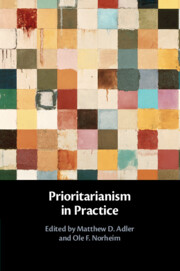Book contents
- Prioritarianism in Practice
- Prioritarianism in Practice
- Copyright page
- Contents
- Figures
- Tables
- List of Contributors
- 1 Introduction
- 2 Theory of Prioritarianism
- 3 Well-Being Measurement
- 4 Prioritarianism and Optimal Taxation
- 5 Prioritarianism and Measuring Social Progress
- 6 Prioritarianism and Health Policy
- 7 Prioritarianism and Fatality Risk Regulation
- 8 Prioritarianism and Climate Change
- 9 Prioritarianism and Education
- 10 Empirical Research on Ethical Preferences: How Popular is Prioritarianism?
- 11 Prioritarianism and Equality of Opportunity
- 12 Prioritarianism and the COVID-19 Pandemic
- Index
- References
8 - Prioritarianism and Climate Change
Published online by Cambridge University Press: 09 June 2022
- Prioritarianism in Practice
- Prioritarianism in Practice
- Copyright page
- Contents
- Figures
- Tables
- List of Contributors
- 1 Introduction
- 2 Theory of Prioritarianism
- 3 Well-Being Measurement
- 4 Prioritarianism and Optimal Taxation
- 5 Prioritarianism and Measuring Social Progress
- 6 Prioritarianism and Health Policy
- 7 Prioritarianism and Fatality Risk Regulation
- 8 Prioritarianism and Climate Change
- 9 Prioritarianism and Education
- 10 Empirical Research on Ethical Preferences: How Popular is Prioritarianism?
- 11 Prioritarianism and Equality of Opportunity
- 12 Prioritarianism and the COVID-19 Pandemic
- Index
- References
Summary
This chapter compares utilitarianism and prioritarianism as alternative social welfare frameworks for evaluating climate policies. We review the main debates in the climate policy literature concerning the parameters of the utilitarian social welfare function, and discuss the analytical requirements and climate policy implications of prioritarianism both in deterministic and stochastic settings. We show that, given the specific characteristics of the climate issue and the assumptions routinely made in the climate literature, prioritarianism tends to support more lenient climate policies than undiscounted utilitarianism. This is based on the assumption of economic and social progress that makes the current generation worse-off than future generations. The presence of catastrophic climate outcomes that endanger the living conditions of future generations (or of the poorest individuals living in the future) relaxes this result.
Keywords
- Type
- Chapter
- Information
- Prioritarianism in Practice , pp. 360 - 407Publisher: Cambridge University PressPrint publication year: 2022
References
- 1
- Cited by



